






Dear fellow Anteaters,
Every time I sit down to write about my years at UC Irvine, I’m filled with a sense of pride and nostalgia. Recently, I learned some news that amplified that pride tenfold: Our Brilliant Future campaign has achieved incredible success, raising over two BILLION dollars and engaging more than 75,000 alumni. And we’re not done yet – the endeavor continues until October 2025! This campaign will shape our university’s future, showcasing the strength of our Anteater community and what our collective efforts are capable of.
Soon, the Anteater family will come together during our annual homecoming celebration. Thinking about the upcoming event, I can’t help but recall my own experiences at past homecomings. The excitement of walking through Aldrich Park, the laughter of friends reuniting and the electric atmosphere of the basketball game – these are the moments that make being an Anteater so special.
This cherished tradition continues to grow stronger each year, connecting alumni, families, students and the entire Anteater community. I’m looking forward to the expanded festival and the introduction of live-band karaoke! (Not sure about you, but I’m hoping to hear plenty of ’80s covers.)
The homecoming basketball game has always been a highlight for many of us. Remember the thrill of cheering for our team in the Bren Events Center? The rivalry with Long Beach State never fails to bring out the best in our players and fans alike.
As I reflect on my journey from student to Alumni Association president, I’m continually amazed by the narratives of fellow Anteaters. In this issue of The Anteater, you’ll read about some truly inspiring alumni, from nonprofit CEOs to innovative entrepreneurs. Their stories remind me of the diverse paths we all take after leaving UC Irvine, yet how we remain linked through our common experiences.
I’d love to hear your own UCI memories and how they’ve shaped your journey. Feel free to reach out and share your stories – it’s these personal connections that make our Anteater community exceptional.
Zot!
Zot! Zot!
Derek Sabori ’95, MBA ’02 President, UC Irvine Alumni Association

Sisters in Good UC Irvine has produced a steady stream of alumni who seek to make an impact on the world. Meet four Anteater alumnae CEOs – of nonprofit organizations that serve the hungry, the homeless and the enslaved – who help make Orange County, and beyond, a better place.


From its state-of-the-art hub at the Cove, UC Irvine’s Beall Applied Innovation helps alumni and faculty connect and work to bring their next big invention to light. Learn more about BAI and four alumni innovators and their successful ventures – including early breast cancer detection and the state’s largest network of hydrogen refueling stations.

Volume 1, No. 2
The Anteater is a publication for all alumni of the University of California, Irvine.
Forever Curious
Interested in continuing to expand your mind at this stage of your life? OLLI at UC Irvine has a class for you. Discover the Osher Lifelong Learning Institute and its courses, which range from the aesthetic to the prosaic, from the scientific to the self-aware. Everyone is welcome, in person or online.

Chancellor Howard Gillman
Vice Chancellor, University Advancement and Alumni Relations
Brian T. Hervey
Associate Vice Chancellor, Advancement Services and Alumni Relations
Shante Carter
Editor Marina Dundjerski
Design RIPE Creative
Copy Editor Kymberly Doucette
Advisory Committee
Daniel Allen, Janna Donoghue, Kate Klimow and Robby Ray
Contributing Writers
Christine Byrd, Greg Hardesty, Cathy Lawhon, Amy Paturel, Kristin Baird Rattini, Ilene Schneider, Alison Van Houten, Kirsten Weir and Mark Whicker
Subscriptions
For address updates, email addresschanges@uci.edu.
Advertising Send inquiries to alumni@uci.edu.
The Anteater is printed with soy-based inks on a recycled paper stock certified by the Forest Stewardship Council. Please recycle.
We Want to Hear From You
To submit a letter to the editor, email anteatereditor@uci.edu.
The Anteater UC Irvine Alumni Association 450 Alumni Court Irvine, CA 92697-1225 (949) 824-2586


By Greg Hardesty

Catching up with old friends, meeting new students, experiencing the university “come alive” – these are some of the reasons why UC Irvine’s homecoming resonates with so many alumni.
“It’s just a great time,” says Michael O’Heany ’86, who won’t be wearing a crown to homecoming on March 1 – though it would be fitting. O’Heany, a board member and finance committee chair of the UC Irvine Alumni Association, was homecoming king in 1984. The former yell leader and founding member of the Kappa Sigma fraternity can’t wait for the annual festival in Aldrich Park that will be capped, as usual, with the men’s basketball evening game at the Bren Events Center. (Long Beach State is this year’s foe.)

The family-friendly celebration includes Ferris wheel rides, live music, food trucks and other eats, the coronation of the new homecoming court, fireworks and a pregame rally.
Now with some 250,000 living alumni, UC Irvine has been staging the daylong event for the last several years, with it making a big comeback after the pandemic. Back in O’Heany’s days, homecoming was eclipsed by other events – such as Celebrate UCI and Wayzgoose – since the pool of alums was relatively small to justify a big bash. No
“I didn’t know anyone coming to UCI. But when I got here, I felt that it was a second home to me.”

longer. Each year, attendance grows, and last year’s basketball game was a sellout.
Double-alum Khajika Soyoltulga ’16, M.P.P. ’20, a huge UC Irvine hoops fan and season ticket holder, regularly attends homecoming with her parents. “I didn’t know anyone coming to UCI,” she recalls. “But when I got here, I felt that it was a second home to me.”
“Being an Anteater is very special,” continues Soyoltulga, who works as a senior financial and policy analyst for UCI Student Affairs and serves on the UCIAA Young Alumni Council. “We’re so unique, and so is our mascot.”
Rabi Narula ’92 and his wife, Patty Le-Narula ’92, are active in several UC Irvine alumni organizations and have been volunteering each year homecoming has been held since 2018, when they became founding board members of Anteaters in Law, the official alumni chapter for lawyers who attended UC Irvine. Says Rabi Narula, “Over the last few years, different UCI schools have really started to engage with homecoming, which has made the event even more impactful.”
Patty Le-Narula notes that homecoming is a great way to connect with past and current students and their families and visit the ever-changing campus.
“Throughout the years,” she says, “homecoming has allowed us to see the university come alive, and that has been very meaningful.”
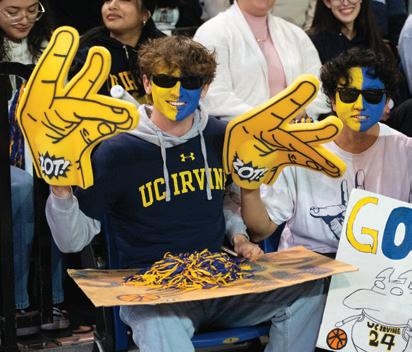





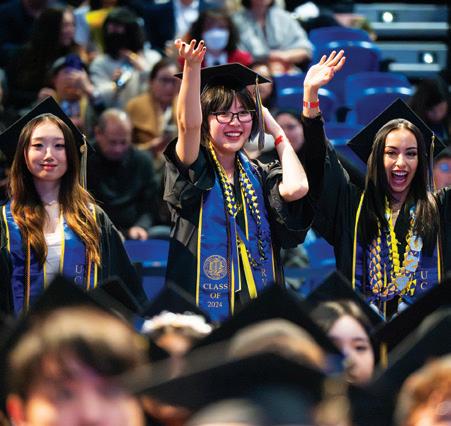

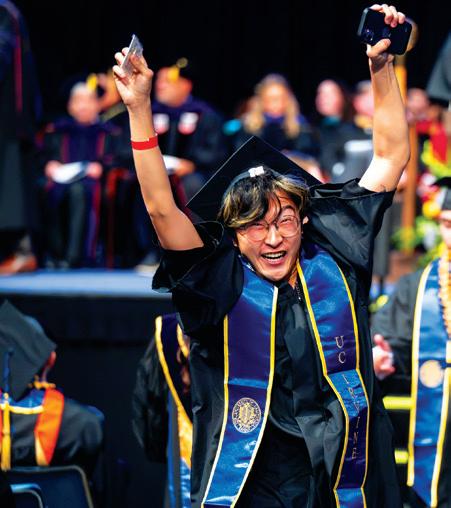

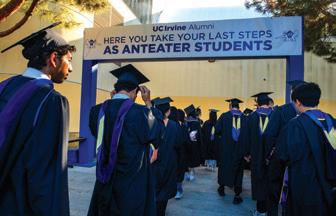
A total of 714 UC Irvine students from 13 schools received their bachelor’s and master’s degrees at the annual fall commencement ceremony, held in the Bren Events Center on Dec. 16. Now in its fourth year, the event has been widely successful, with more participants each year – an increase of 108 in 2024 alone. A second ceremony may be added in the future. Zot! to the grads!
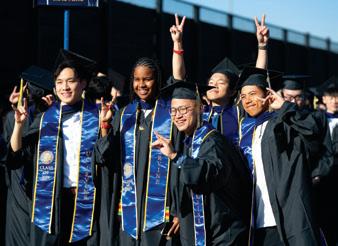


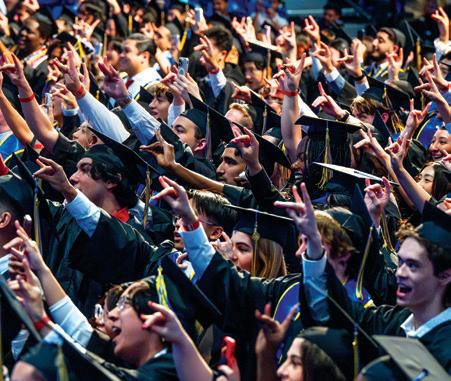

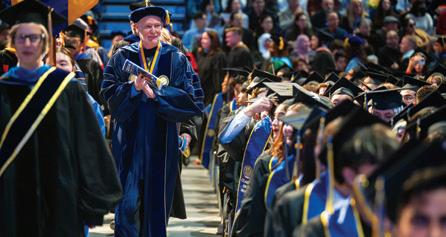
UC Irvine’s ambitious Brilliant Future campaign has surpassed its $2 billion fundraising goal – ahead of schedule – becoming the first philanthropic initiative in Orange County to achieve this milestone. The drive has also surpassed its alumni engagement goal, connecting with more than 75,000 Anteaters. While the campus celebrates the campaign’s current success, university leaders emphasize that their work is not yet done and that the effort continues through Oct. 4. Key priorities moving forward include expanding student scholarship support; completing the new UCI Health – Irvine medical campus; and enhancing the university’s capacity to address sustainability, artificial intelligence, health equity and other critical issues. Said Brian Hervey, UC Irvine’s vice chancellor for university advancement and alumni relations: “With our philanthropic partners, we’re committed to making a positive difference in the world.”
$1.4B+ $180M+ to advance research and departmental support for scholarships, fellowships and student awards
80% of donors are first-time supporters of UC Irvine
$2B+ 75,000+ alumni engaged raised and $200M largest single gift
70% of gifts are under $100
35% 5%
111%
growth in alumni chapters/networks
34% 26%
5 state-of-the-art buildings


Brett Walker, UC Irvine associate professor of Earth system science, and his team have developed a new technique that allows them to see how complex organic molecules made by marine bacteria can store climate-warming carbon in the deep ocean. The researchers conducted their fieldwork at Baffin Bay, between Canada and Greenland, measuring the concentrations of carboxylrich alicyclic molecules in seawater, and discovered that certain kinds of organic molecules are preferentially stored in the deep ocean, whereas others cycle quickly to the surface. “We used to think CRAM built up in the deep ocean,” said Walker, senior author of the study, published in Nature Communications “But if you look at the concentration data we produced for Baffin Bay, a completely different picture emerges. … If more CRAM can be stored in the deep ocean, presumably it would have the potential to mitigate atmospheric climate [issues] on centennial timescales.”
Researchers at UC Irvine and other international institutions have for the first time achieved atomic-scale observations of grain rotation in polycrystalline materials. Widely used in electronic devices, aerospace technologies, automotive applications and solar energy systems, these substances have long been studied for their unique properties and structural dynamics. Using state-of-the-art microscopy tools housed in the UC Irvine Materials Research Institute, scientists were able to heat samples of platinum nanocrystalline thin films and witness the mechanism driving grain rotation in unprecedented detail. Their findings are the subject of a paper published in Science. Researchers “have speculated and theorized on phenomena occurring at the boundaries of crystalline grains for decades, but now – through the use of the most advanced instruments available to the scientific community – we have been able to transition from theory to observation,” said lead author Xiaoqing Pan, UC Irvine Distinguished Professor of materials science and engineering and UC IMRI director. “This knowledge is invaluable for advancing technologies in various industries, including the electronics, aerospace and automotive sectors.”

A research team led by UC Irvine has engineered an efficient new enzyme that can produce a synthetic genetic material called threose nucleic acid. The ability to synthesize artificial chains of TNA, which is inherently more stable than DNA, advances the discovery of potentially more powerful, precise therapeutic options to treat cancer and autoimmune, metabolic and infectious diseases. A paper published in Nature Catalysis describes how the team created an enzyme called 10-92 that achieves faithful and fast TNA synthesis, overcoming key challenges in previous enzyme design strategies. Inching ever closer to the capability of natural DNA synthesis, the 10-92 TNA polymerase facilitates the development of future TNA drugs. “This achievement represents a major milestone in the evolution of synthetic biology and opens up exciting possibilities for new therapeutic applications by significantly narrowing the performance gap between natural and artificial enzyme systems,” said John Chaput, corresponding author and UC Irvine professor of pharmaceutical sciences.
By Amy Paturel
Every cell in the body needs salt to function. Salt contains a mix of sodium, magnesium, calcium and potassium, which helps maintain the delicate balance of water to minerals that keeps you hydrated. But consuming too much salt –or too little – can wreak havoc on your ability to get enough sleep.
“While limiting salt is a common strategy for managing chronic conditions like hypertension, our bodies still need sufficient salt to function properly,” explains Jaclyn Leong, a doctor of osteopathic medicine with UC Irvine’s Susan Samueli Integrative Health Institute who specializes in integrative and obesity medicine.
Research links extremely low-salt diets – less than 500 milligrams daily – with higher levels of norepinephrine, a stress hormone that promotes wakefulness. Too little salt can also interfere with your ability to reach and remain in rapid eye movement sleep. REM is the deepest, most restorative cycle of sleep.
Most Americans, however, get too much salt. Excess sodium boosts the odds of developing high blood pressure, heart disease, stroke and kidney disease. It also interferes with sleep patterns. Research suggests that eating a high-sodium dinner is associated with delays in sleep onset, multiple night awakenings, and about two to three hours of disrupted sleep.
• Sweating
• Muscle cramps
• Nonrestorative sleep, low REM sleep and/or insomnia

So how do you strike the right balance? According to Leong, the typical American should aim to get between 1,500 and 2,300 milligrams of salt daily. But the U.S. Food and Drug Administration reports that most Americans blow past that recommendation, with an average intake of 3,400 milligrams – more than 70 percent of which comes from packaged and prepared foods.
“Salt is hidden in all sorts of foods, not just processed foods and snacks,” Leong says. “Anything that’s packaged – from salad dressing to frozen chicken breasts – often uses salt as a preservative.”
She emphasizes that salt needs aren’t one-size-fits-all. Factors like age, weight, genetics, lifestyle and even the weather can influence how much sodium your body requires. Athletes, for example, need more salt than people who are sedentary because they lose salt through sweat and activity.

The FDA recommends that adults limit their daily sodium intake to less than 2,300 milligrams, equivalent to about 1 teaspoon of table salt.
To hit the sweet spot with salt, prepare foods at home with fresh ingredients, pay attention to sodium content on labels and monitor your consumption. “It’s also important to be aware of signs and symptoms that you’re getting too much or too little salt and adjust your intake accordingly,” Leong says.
• Bloating
• Thirst
• Swollen hands, feet and/or face
• Headaches
• Fragmented sleep, more REM sleep and/or vivid dreams or nightmares
Shayan Doroudi, Assistant Professor of Education

Two years ago, the artificial intelligence tool ChatGPT burst onto the scene. In the short time since, generative AI has upended the ways we produce and share written information, pursue scientific discoveries, diagnose diseases and even create art. The sci-fiworthy technology is also impacting how we learn – a topic of particular interest to computer scientist and education researcher Shayan Doroudi, UC Irvine assistant professor of education. He first became curious about artificial intelligence as a computer science undergrad at the California Institute of Technology, when taking an online class about AI. It was the early 2010s, and massive open online courses – which are free and draw thousands of students from around the world – had just made their splashy debut. The class sparked Doroudi’s interest in AI. But it also got him thinking about the power of online education platforms. How, he wondered, might technology make education more effective?
It’s a question he’s been asking ever since. Doroudi went on to intern at a company that produced MOOCs, then earned an M.S. and a Ph.D. in computer science at Carnegie Mellon University in Pittsburgh. His thesis focused on integrating human and machine intelligence to improve curriculum design.
After finishing his doctorate in 2019, Doroudi joined the faculty at UC Irvine, where he heads the Models, Analytics, Technologies, and Histories of Education lab. The acronym, MATHE, is an ancient Greek root that means “learning” – a neat summation of Doroudi’s interests.
“One of the big things I’m thinking about is how we can learn about learning by studying it in both humans and machines,” he says. “Can we use artificial intelligence as a conceptual tool to study how people learn and then use those findings to help us design better educational systems?” Doroudi spoke with The Anteater contributor Kirsten Weir about AI and the questions driving his research.
Some people are excited by AI, while others are nervous about negative impacts such as cheating or spreading misinformation. What do you think?
I think there are exciting potential uses and also a lot of opportunities for these tools to be misused. But this kind of debate isn’t new. Cheating existed before, and misinformation existed before. If history is telling, I don’t think AI is going to drastically change what’s happening in classrooms – for better or for worse. That said, we need to be paying attention and thinking about how to encourage the most productive uses of AI in education.
What are some of the potential benefits and risks of AI in the classroom?
There’s a lot of interest in using AI to tutor kids. But one of the concerns with generative AI tutoring systems is that the AI might start making things up or go off in the wrong direction. It’s hard to guarantee it will behave the way we would want a tutor to behave. But maybe it’s OK if the AI is wrong, depending on how we’re trying to use it.
When would it be OK for AI to make a mistake?
We’re exploring how AI tools could help students learn in a more exploratory way. If a student is stuck, AI might offer several suggestions. Some might be right, some might be wrong, but the student can explore those ideas.
Or AI could give students a starting point to work from. We’re looking at a programming language from the 1960s called Logo that you can use to make shapes and patterns. Logo has been used to explore the intersection of geometry and art, and we’re trying to add an AI component to help students learn geometry in a more exploratory way. Say a student tells the AI to generate code to create a picture of a cat. The AI is good enough to produce something that looks like a cat, but some shapes will be off, or some elements might be in the wrong place. The student can then go in and fix the code. In that kind of application, maybe it’s OK that the AI gets things wrong.
Are there other ways you’re studying learning in the context of AI?
In one new project funded by the John Templeton Foundation, I’m collaborating with Duncan Pritchard, Distinguished Professor of philosophy at UC Irvine, and Gabe Orona, a postdoctoral scholar in education sciences at the University of Tübingen in Germany.
If history is telling, I don’t think AI is going to drastically change what’s happening in classrooms –for better or for worse. That said, we need to be paying attention and thinking about how to encourage the most productive uses of AI in education.
Professor Pritchard has done a lot of pioneering work studying intellectual virtues such as curiosity, integrity, intellectual humility and intellectual tenacity. We want to know: When high school and college students use generative AI tools, to what extent are they aligned with these virtues?
The most obvious case in which it wouldn’t align is when students aren’t showing integrity, like using AI to write an essay. But there are more nuanced cases as well. One intellectual virtue is intellectual autonomy – thinking for yourself. Ideally, learning is a big part of the undergraduate experience. Students shouldn’t be offloading their thinking to tools like AI, even if they’re using AI in ways that don’t go against course policies.
Do you think we can learn to use AI in intellectually virtuous ways?
In a later part of the project, we plan to look at how we can use AI as a tool to foster learning about intellectual virtues and then to actually change students’ behavior so that they’re displaying those virtues – when using AI and beyond.
In a world where everyone’s thinking about what we can do with AI to increase productivity, I also want to think about how these tools can help us reflect on what it means to be human. AI forces us to think about what makes us unique. What does it mean to have these intellectual virtues? Technology shouldn’t take learning away from us. Hopefully, learning will always be an essential part of the human condition.
By Kristin Baird Rattini

K-pop music is not the only South Korean import to take the U.S. by storm. South Korean skincare products have become tremendously popular in recent years, thanks in large part to Charlotte Cho ’06 and her Soko Glam online marketplace.
A Southern California native, Cho discovered South Korea’s “skin-first” philosophy while working in public relations for Samsung in Seoul – her first job out of college. “The culture I saw in South Korea was about skincare being a holistic practice about prevention, rather than turning back the hands of time,” she explains. “That felt really refreshing and different.” She trained as an aesthetician to learn more about the field.
Cho and her husband, David Cho, faced a lot of naysayers when, in 2012, they launched Soko Glam, which sells a curated selection of South Korean skincare products. “People weren’t shopping online then for new skincare brands they’d never heard of, touched or felt,” she says. But Cho was undaunted, determined to see her passion project succeed. She’d worked since the age of 16 and paid her way through UC Irvine; she was used to hard work and long hours. And Cho has an independent streak. “I’ve always been willing to try things no one has done before,” she says.
Drawing on her UC Irvine film and media studies degree, she launched The Klog, a blog to educate consumers about South Korean beauty practices. Before long, well-known South Korean beauty brands such as Skinfood and Missha approached Cho directly to be featured on Soko Glam – a major milestone. Media coverage, including in The New York Times, drove even more traffic to the website. As revenues grew, Cho noticed that the majority of Soko Glam’s customers were not Asian. “That was exciting,” she says. “We were appealing to a diverse group of customers.”
In 2018, Cho launched her own Korean sensorial skincare line under the name “Then I Met You.” “It’s a phrase to describe a positive turning point in your life,” she says. The brand already sells online and in Sephora stores overseas. It will make its U.S. debut this spring, when it will be featured on the “Next Big Thing” shelf in 400 Sephora stores across the United States – including the outlet at South Coast Plaza in Costa Mesa. “That’s where I used to go all the time when I was a UCI student. It was the place to be,” Cho says. “The fact that Then I Met You will be sold there is so exciting.”
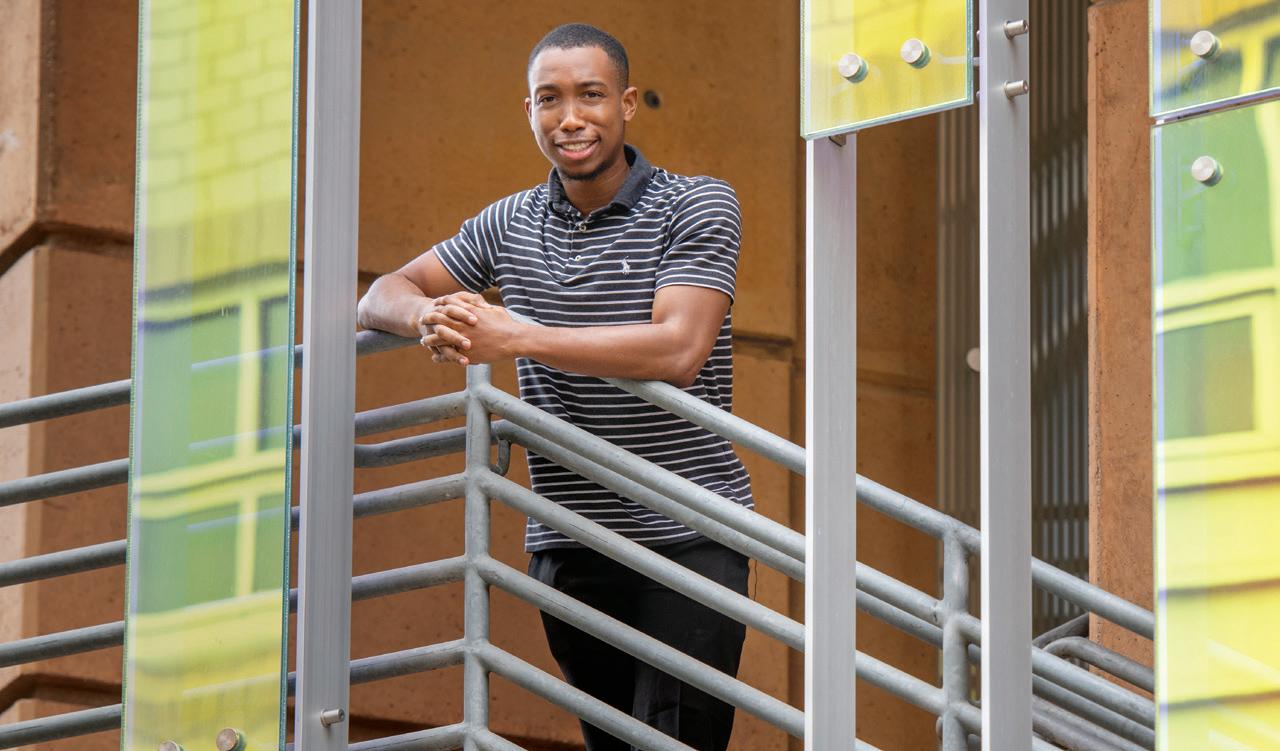
With their fledgling import business Global Savors, David Sanusi ’21 and Yohan Ranaivo ’21 are on their way to becoming oil barons – coconut oil barons, that is. The partners are forging connections with international suppliers and providing high-quality coconut oil, coconut sugar and other ingredients to U.S. manufacturers of cookies, ice cream and other sweet treats.
When they first met as roommates in Arroyo Vista’s Ele Si Rosa Parks Theme House, Sanusi, an international studies major from Los Angeles, and Ranaivo, a business economics major from Madagascar, recognized in each other a kindred entrepreneurial spirit. “We were constantly looking for different ways to generate income in college,” Ranaivo says. They hosted events, such as college parties at external venues that drew attendees from across Southern California. They bought odd items for cheap on Craigslist – a fish tank, a set of weights, etc. – and resold them at a profit on the OfferUp website. Their pivot to food ingredients came through a family connection: Ranaivo’s aunt is Madagascar’s second-largest producer of Malagasy vanilla and cocoa beans. The pair took delivery jobs with Instacart one summer to pay for their initial inventory of Madagascar spices and other ingredients and to launch their business under the name Madagascar Savors. They went door to door to restaurants in upscale Los Angeles neighborhoods to pitch their products.
Through a networking event at UCI Beall Applied Innovation, they found a key mentor: Peter Guidry, a Temecula marketing consultant with spice industry connections. “He got us to think bigger and has helped us learn how to navigate negotiations,” Sanusi says. Once the pair realized that there was greater profit potential with coconut oil and sugar out of Indonesia, they broadened their focus and changed their name to Global Savors.
As they’ve doubled their revenue in each of the past two years, Ranaivo and Sanusi have experienced the risks and rewards of global commerce. They’ve learned to quote freight prices with enough buffer to account for the random weather, geopolitical events and trade issues that can send rates soaring. They’ve learned to closely monitor and adhere to the exacting regulations and certifications for organic products, which most of their customers prefer.
As chief operating officer, Sanusi handles such regulatory and financial matters, while Ranaivo, as CEO, manages customer relationships and new opportunities, which are growing. Their products are now used in such items as peanut butter, chocolate and cookies and in retail brands sold in grocery outlets like Whole Foods, Costco and Kroger. “We understand what each of us does well,” Ranaivo says. “We have different skill sets that are equally important in helping our business continue to grow.”
IN Anteater alumnae CEOs help make Orange County — and beyond — a better place
By Cathy Lawhon



Orange County reaps profits from a rich vein of UC Irvine alumnae who informally call themselves Sisters in Good and aim to make the world a better place — especially in the nonprofit arena. They are CEOs of organizations that serve the hungry, the homeless and the enslaved. Some moved to nonprofit C-suites from the private sector. Others dove into public service immediately after graduation. Jennifer Friend, CEO of Project Hope Alliance, has some thoughts about the common denominators: “UCI attracts a lot of first-generation college students. We work hard to get through and want to be part of changing the world.”
“UCI is also still young enough that an air of possibility and invention lives here,” she adds. The availability of multidisciplinary studies allows students to explore humanities, political science, public health, business and law – all of which pertain to nonprofit work. Friend finds “something meaningful, fun and invigorating” in her nucleus of female CEOs, who bonded over the years through their nonprofit work and shared UC Irvine connection. “We show up for each other, whether it’s to cheer when someone is recognized for her work or to talk through the challenges of being a working mom,” she says. “This is heavy, hard work, so sometimes it’s nice to just have a glass of wine and crack up together.”
UC Irvine’s School of Social Sciences launched a mentorship program in 2023 to strengthen that cadre of female executives. A project of the Women of the Dean’s Leadership Society, LeadHER engages 20 students each year in a 10-week course aimed at fostering success and professional support systems.
Amanda Fowler ’99, who majored in social sciences with an emphasis in economics, helped launch the program and says it has enriched the lives of students and mentors alike.
“It’s a way for successful women to give back with time and energy and lift up female students, who could benefit most from mentorship but are least likely to seek it out,” says Fowler, vice president of global corporate giving for Edwards Lifesciences and executive director of the Edwards Lifesciences Foundation. “We help them cultivate soft skills in a highly academic environment.”
In addition to meeting with corporate executives, business owners and community leaders – many of whom are UC Irvine alumni – students tour local businesses and read up on women in the workplace, leadership abilities, communication and identifying one’s strengths.
Fowler expects the cohort to create a path for more women in positions of leadership.
“We need to follow them over time and see how they change things,” she says. “When you get three women on a board of directors, for example, then you feel ‘I’ve got my crew.’ There should never be a time when women feel they can’t speak up.”
On the following pages, we introduce four of the Sisters in Good.
“COVID-19 hit weeks later. Food banking was tested – more need and no food, no volunteers. But we learned what we were capable of.”
Claudia Bonilla Keller ’87 CEO, Second Harvest Food Bank

Some 2,400 flight miles separate the fashion runways in New York from the former El Toro Marine Corps Air Station runways in Irvine. Claudia Bonilla Keller, CEO of Second Harvest Food Bank in Irvine, took about 30 years to cover the distance. Her career path wound from working runway shows behind the scenes for Calvin Klein and St. John Knits to feeding Orange County’s food-insecure population at a staging area that once housed military airships. And she’s learned something at every stop.
“At St. John Knits, they trusted me with a lot of responsibility very quickly,” says Bonilla Keller, who earned a bachelor’s degree in political science at UC Irvine in 1987. “I traveled around the world on photo shoots. I also learned a lot about philanthropy from Mrs. [Marie St. John] Gray. She had me create guidelines for giving money to children’s charities. I realized that’s what I wanted to do.”
After 18 years in fashion, Bonilla Keller served as executive director of the American Heart Association in Los Angeles. In 2012, she joined the LA Promise Fund, where she helped prepare students for successful futures. Her affiliation with Second Harvest began as chief missions officer in January 2020.
“COVID-19 hit weeks later,” she says. “Food banking was tested – more need and no food, no volunteers. But we learned what we were capable of.”
Second Harvest’s first COVID-era food distribution event from the Honda Center parking lot drew thousands of cars and caused a massive traffic jam.
By the end of the COVID lockdown, the Second Harvest team had streamlined the process from three hours to 25 minutes.
By December 2021, when the CEO job position opened up, Bonilla Keller had earned the position.
Today, she and her 100-person workforce serve an average of 400,000 people monthly. Nearly 250 community partners supply about 350 Orange County distribution locations, including houses of worship, schools, senior centers, shelters, soup kitchens, transitional housing and the food bank warehouse.
Bonilla Keller’s proudest accomplishment is starting to change how success is discussed and quantified.
“The measurement has been solely in pounds of food distributed,” she says. “Now we’re also thinking in terms of how many people we help lift up. We try to lift the stigma so people who have lost a job or spouse or experienced domestic violence can choose culturally appropriate, nutritious food and go home and cook a meal. It’s now ‘people’ in addition to ‘pounds.’ ”
The need in Orange County is growing faster than in California as a whole, largely due to high housing costs. Still, Bonilla Keller hopes for a brighter future.
“I would love nothing better,” she says, “than to put myself out of business.”
“
The Orange County Department of Education identified 26,000 children experiencing homelessness in O.C. schools last year. Similar to my family, many families try not to let people know. They sleep in cars, get ready for school in bathrooms, because they fear stigma and social services.”
Jennifer Friend found her calling through the strength of family and faith that sustained her when she and her parents and three brothers lived in a 214-square-foot Orange County motel room. Keeping a roof over their heads proved difficult given her father’s unpredictable income as a technology entrepreneur and her mother’s preschoolteacher wages.
“We had time periods where we were a stable middle-class family,” Friend recalls. “We were always close, with a strong sense of faith and a belief that life wasn’t always going to be as it was in that moment.”
That faith empowered Friend, she says, fueling her academic success and admittance to UC Irvine, from which she graduated in 1995 with a B.A. in criminology, law and society. She has since led the Alumni Association and served six years as a voting trustee on the UC Irvine Foundation; she’s currently on the foundation’s executive committee.
Friend earned a law degree from Whittier College and made partner in a large firm before changing gears in 2013 to become the first CEO of Project Hope Alliance in Costa Mesa. The nonprofit – with a $3.4 million budget funded by private philanthropy, grants, and a number of school districts and cities –serves those with stories like her own, offering basic necessities and educational and social-emotional support.
Full-time case managers are embedded into partner schools and devise special education plans, address discipline issues, and ensure that students have what they need to thrive academically and participate in activities such as sports or the marching band. Staff also provide transportation to school or therapy seven days a week. Case management with youth continues through college to age 24. The need is great, Friend says, if sometimes unseen.
“The Orange County Department of Education identified 26,000 children experiencing homelessness in O.C. schools last year,” she says. “Similar to my family, many families try not to let people know. They sleep in cars, get ready for school in bathrooms, because they fear stigma and social services.”

Friend and her team of what she calls “exceptionally gifted people” have helped facilitate a 94 percent high school graduation rate, which is 30 percentage points above the national average for unhoused students. Funding such upstream preventive solutions is preferable, she says, to trying to mitigate impacts downstream: “If we can get these children to high school graduation, it’s 400 percent less likely that they’ll experience homelessness as adults.”
Political uncertainties around public and social services funding will require thoughtful navigation going forward, Friend says. She’s proud of a recent $2.1 million CalOptima grant, awarded based on her vision of what’s possible for Orange County and its children.
“These kids are amazing, creative, resilient,” Friend says. “Why wouldn’t you invest in them?”

Madelynn Hirneise ’10 CEO, Families Forward
Madelynn Hirneise has always embraced change. She arrived at UC Irvine as a biological sciences major, set on becoming a veterinarian. But the commercial aspects of veterinary practice and rough sledding through a required organic chemistry class prompted a switch.
“I thought I’d help people instead, maybe end up at the United Nations,” says Hirneise, who received a bachelor’s degree in international relations in 2010.
The animals’ loss has been humans’ gain. After a postgraduate stint with the Peace Corps, Hirneise returned to Orange County in 2012 as a housing resource specialist with Irvine-based Families Forward. In 2019, her experience and dedication earned her the CEO position. Five months later, COVID-19 provided another opportunity to embrace change.
“Our goal is to pull from the strengths of the families to help them attain economic mobility, whether it’s through education or work experience.”
“We had to break and rebuild,” Hirneise says. “We reduced barriers, changed screening criteria and geographic restrictions to expand services. We continue to poke holes and create positive chaos.”
The nonprofit’s annual budget of about $10 million, funded by grants and donations, helps families with children achieve economic independence and housing stability. The most recent data, from 2023, shows that Hirneise and her team of 50 employees and 2,000 volunteers found homes for 724 families that year. Ninety-three percent of those households remained stable after one year.
Hirneise’s biggest challenge is the lack of housing inventory at all income levels.
“I would love to see intentional flow where we move people into affordable housing and then, as their economic situation improves, they move up and on so units can be made available to families who need them most,” she says.
Instead, she adds, tenants are often stuck because options at the next level are scarce.
“In 2017, the national average length of tenancy in affordable housing was seven years,” Hirneise explains. “Now it’s 10.”
A strategic plan to bring that average down to three years – and to prevent homelessness altogether – is in the works.
“Our goal is to pull from the strengths of the families to help them attain economic mobility, whether it’s through education or work experience,” she says. “Homelessness is cyclical; children who grow up experiencing the trauma of homelessness tend to be at higher risk of being unhoused as adults. We want to break that cycle.”
If resolve can make it so, there’s a good chance that Hirneise will succeed.
“In my senior year at UCI, I lost 100 pounds in 11 months and ultimately ran a marathon,” she says.
“I’m determined, and I understand that when our community succeeds, we all succeed.”
“ We’re facing the greatest human rights issue of our time. Child abuse is rampant, and online sex exploitation is a growing issue we can actually solve. It’s not like a natural disaster we can’t control. But it’s a dark topic, so it’s easier to pretend it’s not real.”
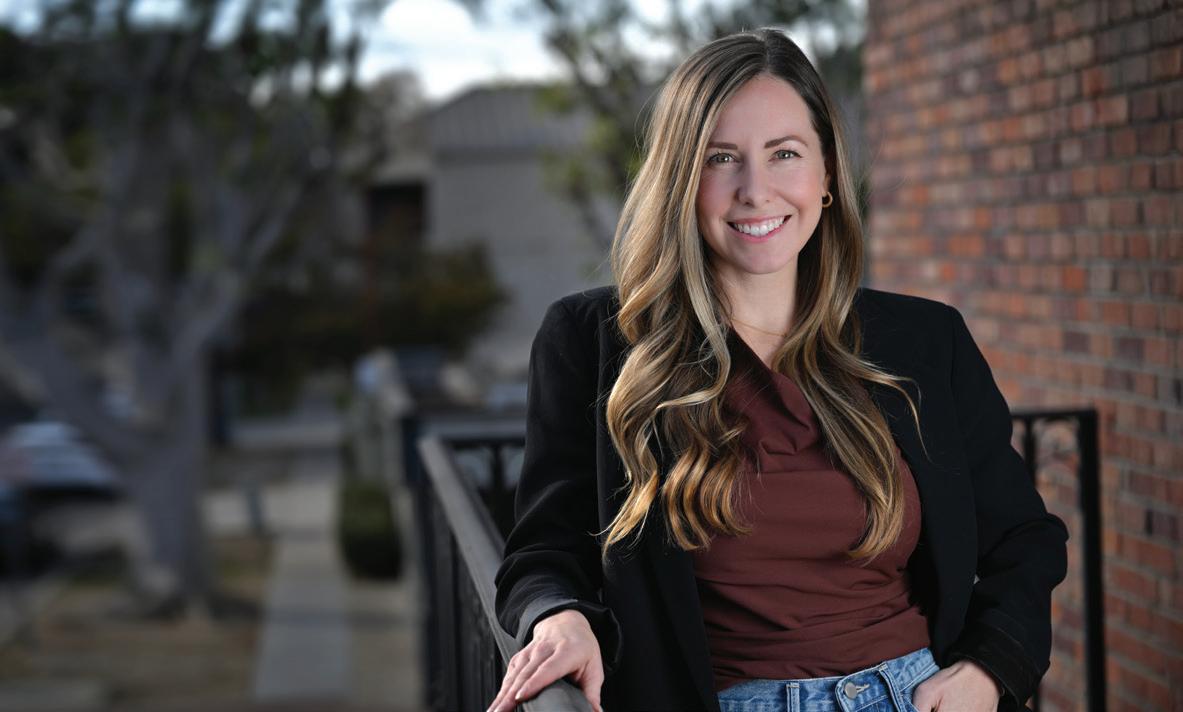
Kelsey Morgan ’10, Ph.D. ’24 CEO, EverFree
When survivors exit human trafficking, the last thing they need is a well-meaning program manager dictating what’s best for them.
Kelsey Morgan, a double UC Irvine alum who received a bachelor’s in international studies in 2010 and a doctorate in social ecology in 2024, understood the need for client input. So she designed Freedom Lifemap, an innovative tool that empowers survivors to define their own path to recovery. Created through a partnership with the UC Irvine Blum Center, it also ensures that the anti-trafficking global movement better understands how to prevent and address human trafficking. Organizations worldwide have begun to use the tool.
“There is a lack of data around what works for survivors,” says Morgan, CEO of EverFree, which is headquartered in Irvine and has sites in Uganda and the Philippines. “The job isn’t done when they exit exploitation. Their vulnerabilities are economic, educational and health-related.”
Her work to end human trafficking and serve survivors began more than 15 years ago. Then, in 2010, she founded Willow International. In 2021, it merged with 10 Thousand Windows to create the global nonprofit EverFree.
With a $4.5 million budget from grants, private philanthropy and corporate sponsors, it serves the wide-ranging needs of those coerced into unethical labor in factories, farms and private households; those subjected to sexual exploitation; and those
impacted by forced marriage. A recent International Labor Organization report estimated that 50 million people worldwide are trapped in modern slavery.
Eliminating forced labor by 2030 would require about $212 billion globally, according to the ILO. Therein lies Morgan’s biggest roadblock: mustering public will to acknowledge the problem and fund solutions.
“We’re facing the greatest human rights issue of our time,” she says. “Child abuse is rampant, and online sex exploitation is a growing issue we can actually solve. It’s not like a natural disaster we can’t control. But it’s a dark topic, so it’s easier to pretend it’s not real.”
Still, her team persists, and their efforts fill Morgan with pride and gratitude.
“When people visit our sites, they are overwhelmed by the professionalism, dedication and passion of the staff,” she says. “This work is challenging; they see the darkest parts of humanity every day. They are absolute heroes.”
Morgan is also grateful to mentors who directed her to UC Irvine’s School of Social Ecology when she was searching for data-driven fixes for modern slavery.
“The school was a perfect fit,” she says. “It’s all about science in action, developing practical solutions on the ground so that tools are usable. Our big vision is that better care, data, cooperation and collaboration can create a world where everyone is free.”
By Alison Van Houten

In 2020, Beall Applied Innovation moved into a sparkling new home at UCI Research Park. The 31,000-square-foot Cove, a state-of-the-art hub in which innovators can work and connect, was a portent of even more exciting things to come.
Since 2014, BAI has been an on-campus unit that strives to increase the influence of UC Irvine’s research. “We do that primarily by helping teams commercialize the research that’s coming out of the campus,” says Errol Arkilic, chief innovation officer at UC Irvine and executive director of BAI.
About two years ago, BAI decided to zero in on four primary industries: therapeutics, medical devices, sustainability and artificial intelligence for storytelling. These days, 40 people oversee industry-sponsored research, new-venture creation, a skunkworks branch called Enterprise Collaborations and, most importantly, technology licensing in the Research Translation Group.
“We made an intentional shift to really focus on the ideas that are coming out of the labs that are backed by federal funding and industry and come with deep intellectual property,” says Arkilic, who joined BAI in 2021.
He established one of BAI’s key initiatives, I-Corps, earlier in his career while working for the National Science Foundation. The federal grant program helps academics learn how to pursue a business model analysis to determine the value of their intellectual property.
“When I was at NSF, I found that an enormous number of academic researchers didn’t have any experience in assessing business opportunities enabled by their discoveries,” Arkilic says. “We developed this program to ensure that there’s a disciplined approach to identifying whether or not a company should be formed.”
BAI’s flagship program is Proof of Product, which offers $25,000 to $100,000 grants to researchers with promising discoveries. The funds aid in a range of activities, including prototyping and feasibility studies, as well as the customer-discovery process. But BAI doesn’t just help would-be entrepreneurs.
Arkilic encourages alumni who are confronting obstacles in their professional fields to consider UC Irvine a place to turn for assistance. “Research challenges aren’t just scientific,” he says. “They’re also economic. They’re also HR-related. They’re also marketing-related. They’re psychology-related. We have a very powerful research organization that can help alumni with the issues they’re faced with in their day-to-day jobs through applied research.”
“Research challenges aren’t just scientific. They’re also economic. They’re also HR-related. They’re also marketing-related. They’re psychology-related. We have a very powerful research organization that can help alumni with the issues they’re faced with in their day-to-day jobs through applied research.”
BAI serves a larger purpose as well: burnishing the university’s reputation. Says Arkilic: “The stature of the university is a function of its impact on society, and the impact on society is a direct result of turning research into products and services.”


Judit Giró Benet, M.S. ’00, embedded and cyber-physical systems

Existing breast cancer detection technology is expensive, and it requires machinery and expertise that not everyone can access. Enter: The Blue Box, a portable, affordable and more easily used alternative. Created by Spanish biomedical engineer Judit Giró Benet, this urine reader has a proprietary electronic nose that senses breast cancer biomarkers that become volatile when a sample is heated. The data is then analyzed by an AI model developed at Beall Applied Innovation that recognizes patterns predicting cancer with 88 percent sensitivity. Her company plans to run clinical trials in 2025 and hopes to launch in gynecology clinics by 2026.


Bianca Gates ’20, international studies
Bianca Gates just wanted chic slippers for entertaining guests at home. But the company she co-founded in 2015 exploded in popularity, becoming a cushy going-out staple for celebs like Meghan Markle and Katie Holmes. Gates rode the wave with savvy, and these days, the shoe range even includes boots – with the signature comfort that made Birdies so beloved in the first place.

Tim Brown, Ph.D. ’08, mechanical engineering
Shane Stephens, Ph.D. ’11, engineering
Transportation and sustainability researcher Tim Brown was frustrated by the world’s sluggish embrace of hydrogen, a zero-emissions fuel that produces only water vapor, to power fuel-cell electric vehicles. In 2013, he and fellow UC Irvine engineering alum Shane Stephens helped co-found Irvine-based FirstElement Fuel, which is developing the infrastructure necessary for more widespread adoption of this green technology. The company’s True Zero network of refueling stations in California is now the world’s most extensive.


Jenny Woo, Ph.D. ’22, education
When human development researcher Jenny Woo realized how influential emotional intelligence is in people’s lives, she set out to assist kids and adults in developing it. Nurtured at BAI, Woo’s award-winning Mind Brain Emotion card decks cover a range of themes, from social situations and relationships to critical thinking and workplace challenges. Each card features prompts and exercises to help users consider hypothetical scenarios and apply researchbacked techniques to navigate them.






OLLI provides a diverse array of high-quality classes to foster a lifetime of learning
By Ilene Schneider


Imagine being in a classroom for the pure joy of learning, surrounded by like-minded people – with no tests, term papers, grades or requirements.
Whether your interest is Renaissance art, American history, politics, telling your story through song, understanding what makes a great athlete or using an electronic device, there is an OLLI course for everyone.
Osher Lifelong Learning Institute classes range from the aesthetic to the prosaic, from the scientific to the self-aware. This past fall, for instance, you could choose from American Short Stories; Cultivating Resilience During Distressing Times; California, the Melting Pot; Arts of the Middle East; The Fundamentals of AI; The Orange County Grand Jury; and more.
For me, attending an OLLI class was like taking a pressure-free walk back in time and learning about something completely different. While I had never heard of Al Belson: The Man Who Taught Orange County to Love, Create and Collect Great Photography, I came away with admiration for the Ansel Adams protégé who operated the Newport School of Photography near John Wayne Airport and took exquisite photographs by seeing things that ordinary human eyes miss. I appreciated the loving and knowledgeable presentation offered by Belson’s widow and former student, Eve Belson Fudge.
There was a definite buzz among the 50 or so learners in the classroom, which is near Amtrak’s Irvine train station. As my escort, volunteer Linda Robinson, OLLI at UC Irvine vice president of marketing outreach and social sciences curriculum team leader, says: “There is joy, success, camaraderie and a feeling of wanting to be there for high-quality, university-level classes.”

The notion for OLLI at UC Irvine dates back almost three decades. In 1997, a group of mature learners worked with UC Irvine’s Division of Continuing Education to create the Academy of Lifelong Learning. In 2003, with an initial grant from the Osher Foundation, the academy became part of the growing OLLI network – created in 2001 out of philanthropist Bernard Osher’s belief that learning continues beyond college –and OLLI at UC Irvine became official. Three years later, the Osher Foundation presented an endowment that provides annual earned interest for the OLLI program.
Now OLLI operates on 124 campuses nationwide, and OLLI at UCI is “an essential piece of the continuing education puzzle,” says Krissy Collins, UC Irvine’s dean of continuing education. “We’re here to support learners in developing knowledge and skills and keeping their minds sharp. As an open-enrollment division, we welcome everyone, no matter their age, motivation or interests.”
OLLI volunteers – many of whom are experts in arts and humanities, STEM fields or the social sciences –poll the participants, develop the curriculum, create the brochure and even make coffee. They are accountable for keeping the organization running and teach some of the courses. Professors emeriti and retired deans also find “self-fulfillment in volunteering” and lead classes for many years in a row, Robinson says. Courses repeat or rotate based on member feedback.
The only staff employee, Alexandra Garcia, OLLI program manager since June, is pivotal in ensuring that the mechanics of the program are in place. “The community is amazing,” she says. “People want to learn, socialize and help each other.”
In 2020, the pandemic prompted OLLI to temporarily convert to an online experience. Today, OLLI offers a hybrid format that continues to flourish. Most current classes can be streamed, allowing individuals to also enjoy them online. After all, who would want to miss out on the fun of forever learning?
OLLI at UC Irvine is supported by membership ($235 annually or $160 per semester, which entitles the member to attend all the classes and access more than 700 courses that have been recorded), as well as donations. It is open to everyone. OLLI courses are at 10 a.m. and 1:30 p.m. with no overlap, allowing participants admission to the full lineup. Frequently, there are morning mingles, lunches, social hours and special events, such as trips to SoFi Stadium and the Norton Simon Museum.
For more info, go to https://ce.uci.edu/olli.
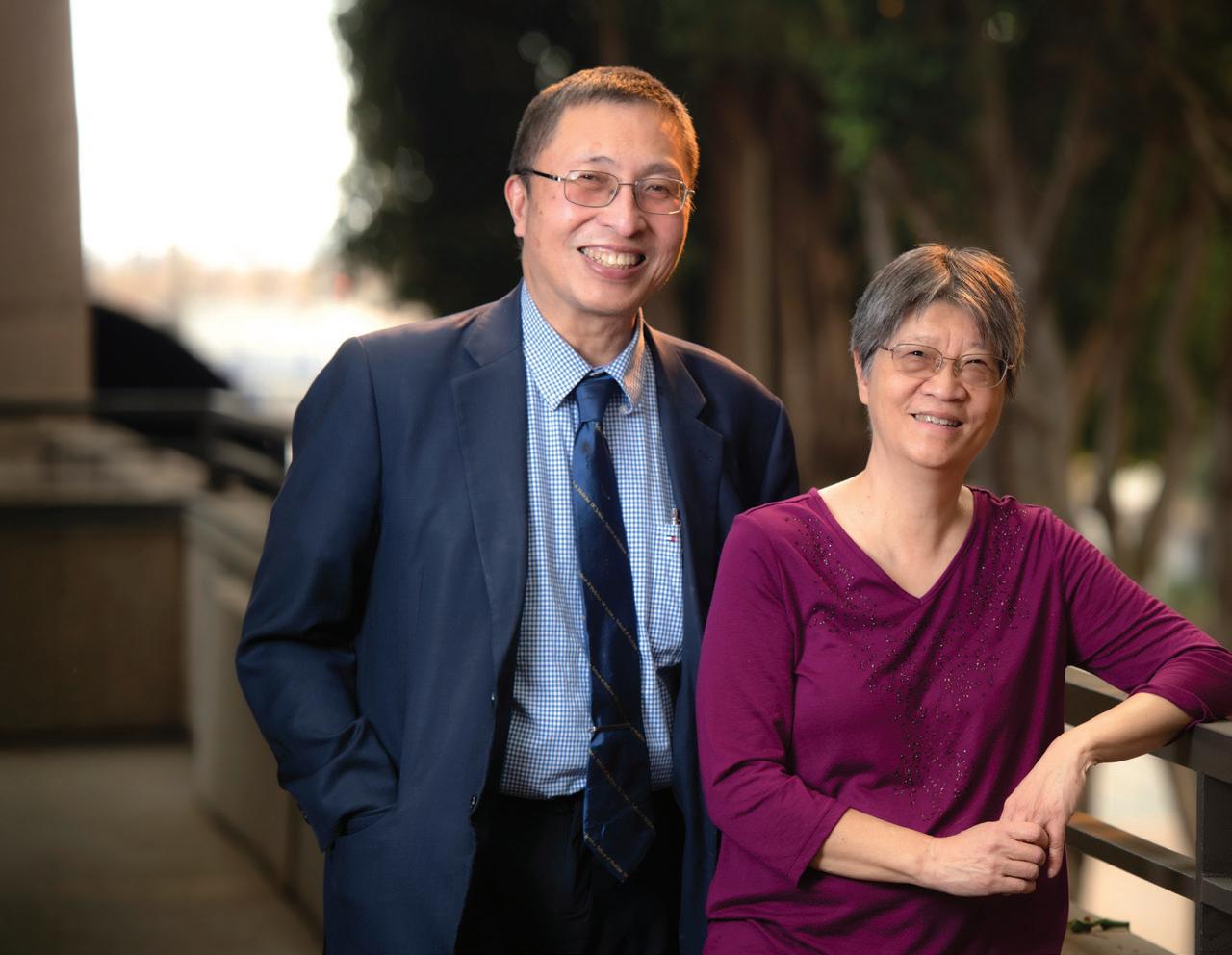
Alumni David and Diana Lieu are building their legacy by supporting Anteaters
By Christine Byrd
David Lieu, M.D. ’79, and Diana Lieu ’79 want aspiring doctors to pursue their passions in healthcare without worrying about medical school debt. The couple are the first alumni to endow a full-tuition scholarship to the UC Irvine School of Medicine. In addition to their financial support, the Lieus hope their story will inspire students to persevere through challenges.
David was a teenage volunteer at a hospital when a supervisor told him he was too shy to succeed as a doctor. He wasn’t invited back to volunteer. Undeterred, he earned a bachelor’s degree in chemistry at UC Berkeley – the first in his family to finish high school or go to college – and, at just 19, was accepted to medical school at UC Irvine.
Diana Ma, who was majoring in biology, met David Lieu at a Halloween party sponsored by the Chinese Association at UC Irvine. Like him, she was a first-generation college student whose parents were immigrants. While Diana went on to earn a Pharm.D.
from USC and become a pharmacist, her future husband – they were married in 1980 – completed a residency at USC, a fellowship at UCLA and an MBA at UC Berkeley. As a pathologist, he eventually opened his own clinic specializing in ultrasoundguided fine-needle aspiration and core-needle biopsy with microscopic interpretation to diagnose cancer. Not only does he do more than 2,000 fine-needle aspirations annually, but he teaches the procedure and microscopic interpretation to cytopathology fellows from UC Irvine, UCLA and Cedars-Sinai who rotate through his clinic, as well as to pathologists at national and international medical conferences. David Lieu has been honored for excellence by the College of American Pathologists and the Papanicolaou Society of Cytopathology and has been named a Distinguished Alumnus of the UC Irvine School of Medicine.
“Not too bad for someone who was told he wouldn’t be a good doctor,” he says, laughing. “I tell students,
“I tell students, ‘Even if no one believes in you, the keys to success are to ignore their doubts, pursue your dreams and believe in yourself.’ ”

‘Even if no one believes in you, the keys to success are to ignore their doubts, pursue your dreams and believe in yourself.’ ”
The Drs. David and Diana Lieu Medical Student Scholarship Endowment, which will cover four years of tuition for one student in each incoming medical school cohort beginning in 2026, fills a crucial need. Doctors today graduate, on average, with $200,000 in debt. Although UC Irvine’s average is slightly lower, the financial burden can put invisible pressure on students to pursue a specialty based on income rather than interest.
“I’m thrilled that David and Diana Lieu are giving medical students a fresh start as they embark on their careers, enabling them to choose a field that engenders their passion and make choices independent of debt,” says Dr. Michael J. Stamos, dean of the UC Irvine School of Medicine.
He envisions offering more scholarships like this, especially in the school’s mission-based programs
that focus on developing physician-leaders who serve Latino communities; advocate for African, Black and Caribbean patients; or incorporate the philosophies of integrated medicine. In addition to benefiting scholarship recipients, such funding boosts the medical school’s recruitment efforts.
“Full-tuition scholarships help us attract the best and brightest students who exemplify the UC Irvine School of Medicine’s mission to discover, teach, heal,” Stamos adds. “The Lieus have been steadfast supporters for decades, and now, by paying it forward to the next generation, they are going to help propel the UC Irvine School of Medicine into the top 25 nationally.”
This endowment is the Lieus’ third major gift to their alma mater. In 2015, they created a fellowship for first-generation college students attending UC Irvine’s School of Medicine that covered books, food and parking. That same year, Diana Lieu and her siblings established an undergraduate scholarship in honor of their parents, the Thomas and Lillian Ma Endowed Scholarship. Seven of the Mas’ children and grandchildren have been Anteaters: two of Diana Lieu’s three older siblings and one child of Diana Lieu and each of the three older siblings. In keeping with family tradition, Diana and David Lieu’s son graduated from UC Irvine, while their daughter followed her father’s footsteps to UC Berkeley.
The couple’s unflagging commitment to fellow Anteaters is rooted in their own experiences as children of immigrants who encouraged them to use education as a stepping-stone to a better life. Diana Lieu was a Regents’ Scholar, which made it possible for her to attend UC Irvine. And David Lieu’s parents feared that he would not be admitted if the medical school knew his family couldn’t afford to pay, so he avoided applying for financial aid until after classes started. When he finally did, he also received a Regents’ Scholarship.
“We were students at one time who did not have any education or any money,” David Lieu says. “We think about how much UC Irvine has helped our careers, and we want to pave the way for the next person – make it easier for them.”
In recognition of the Lieus’ support of the UC Irvine School of Medicine, the student gathering space on the third floor of the Medical Education Building will bear their names. David Lieu, reflecting on his own journey, wrote words of encouragement to current students using the room: “If you doubt yourself, take solace in the fact that UCI believes in you. … You are here because you deserve to be here.”
David and Diana Lieu believe in them too.
UC Irvine’s basketball teams continue to shine on a national level
By Mark Whicker

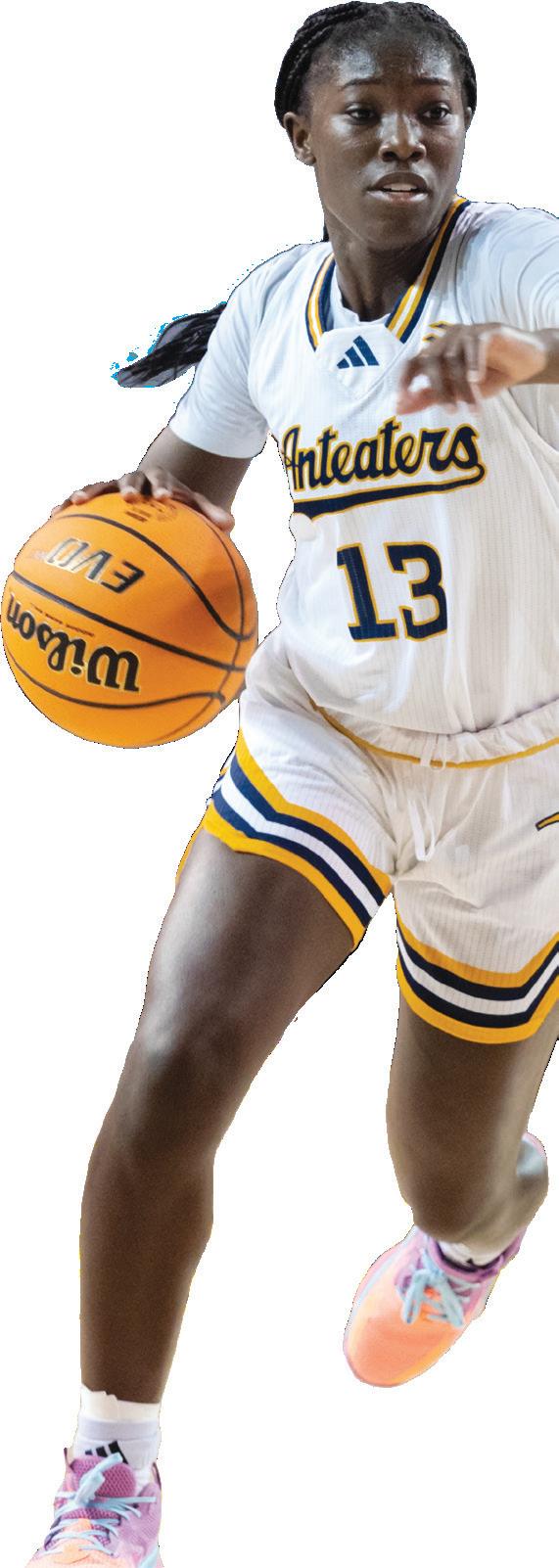



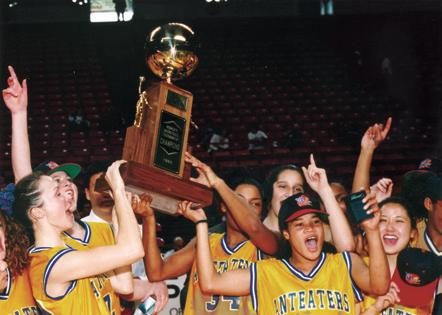


Basketball at UC Irvine has had a long legacy of success. And as the Anteater teams wrap up their 2024-25 nonconference schedule, they’re looking forward to potential postseason runs.
The men won their first nine games of the season and were as high as 22nd in the NET rankings, a metric upon which the NCAA Tournament selection committee relies. The Anteaters received votes in the national polls and have been ranked among the country’s best in free throw percentage, defensive rebounds and winning percentage.
The women began their season 6-4, as they tried to build on last year’s Big West Tournament championship, which led to an NCAA Tournament bid. Both programs have succeeded in finding players who are overlooked by bigger schools and can also handle UC Irvine’s classroom requirements. Since coach Russell Turner took over the men’s team in the fall of 2010, he has had 14 players from foreign lands, including 7-foot-6 Mamadou N’Diaye from Senegal, whose height and wingspan drew national attention.
Tamara Inoue, the women’s head coach, has had eight international players in nine years. Déja Lee, from Surrey, British Columbia, is the reigning Big
“ We used to be viewed as the scrappy underdog. But that’s not really how we feel about ourselves, as a team or a university.”
West Player of the Year. She also majors in biological sciences and is on track to become a neurosurgeon.
“Déja always tells me that basketball isn’t why she came here,” Inoue says, laughing. “She wants to work with the human brain. That’s why I try to be really nice to her, because one day she might be working on my brain.”
Nevaeh Dean, a graduate transfer from Cincinnati, says she’d never had a crepe in her life until Clara Djoko and Ines Gnahore, two Anteaters from France, educated her. The women’s team also has players from Australia, Israel and Spain.
“You’ve got to build connections,” Dean says, referencing a team Halloween pumpkin-carving session and a retreat at which the players stood on a balance beam, lined up in birth order, and supported each other with ropes.
This past fall, Noah Zamora became the first Anteater tennis player to compete in the NCAA Singles Championship since 2011 and the first to advance in the tournament since 1989, upsetting No. 13 Sebastian Dominko of Notre Dame in the Round of 64. The senior is ranked a career-high 31st in the Intercollegiate Tennis Association’s NCAA Division I men’s singles rankings.
The men’s water polo team captured its second consecutive Big West regular-season title with a perfect 5-0 record. The Anteaters had a nine-game win streak, the longest since 2013; 2024 play also included upsets over No. 4 Pepperdine and No. 6 Cal, with UCI reaching a season-best ranking of No. 5.
The women’s golf team won the title at the Wolverine Invitational in October with a 54-hole school record score of 853 (283-286-284). Freshman Alona Avery finished second, carding a score of 207 (69-68-70) – the third-lowest in UC Irvine history.
Men’s volleyball starts the season ranked No. 3 nationally. Senior Hilir Henno returns after being named American Volleyball Coaches Association National Collegiate Men’s Player of the Year. He’s the sixth Anteater student-athlete to earn that distinction.
Senior Anna Vogtmann broke her own 6K school record at 19:49.3 to claim runner-up honors at the 2024 Big West Women’s Cross Country Championship. It was the Anteaters’ best individual finish at the conference meet since 2008.
Inoue, from Laguna Hills, came to UC Irvine from New Mexico State. She took over a team that had lost 51 of 63 games the previous two years, and she was its fourth coach in a 12-year span. Her first UCI team went 5-26.
“I gave myself seven years to turn it around because it’s such a tough conference,” Inoue says. “I put an emphasis on getting out of my bubble, going around to different parts of campus, meeting professors, learning what makes people successful here. It’s such a beautiful place, a paradise, especially for the non-Californians. And our men have helped us with their success, as has the baseball team. They’ve established what the Anteaters are all about.”
On the men’s side, center Bent Leuchten of Germany is the leading scorer on a squad that has players from New Zealand, Canada and Turkey. “Obviously, this is a pretty nice place to go to school,” Turner says.
The real attraction is the Anteaters’ record. Turner has fashioned one of the most consistent programs in the country, whether it’s tagged as “mid-major” or not.
His teams have won seven Big West Conference regular-season titles, including the last two, and two Big West Tournament titles. UC Irvine recently celebrated the 10th anniversary of the men’s team making its first NCAA appearance. In 2019, UC Irvine knocked off fourth-seeded Kansas State for its first-ever NCAA Tournament win. Entering the 2024-25 season, the Anteaters’ winning percentage in conference games was .704.
“We used to be viewed as the scrappy underdog,” Turner says. “But that’s not really how we feel about ourselves, as a team or a university. We’ve identified the type of player who fits here. A lot of times, he’s overlooked. We’ve gone against the grain a little bit. We look for big guys, and we put an emphasis on defense. Player development is always going to be important. And our guys know they have to get the academic work done.”
He refuses to complain about college basketball’s new reality, in which players can transfer and play immediately wherever they feel the grass is greener and bigger programs can use collectives and name, image and likeness opportunities to pay their personnel.
“I’m so glad I worked in the NBA,” says Turner, who was an assistant with the Golden State Warriors. “You get accustomed to players coming and going. We’ve lost some good ones, but we’ve gained some too.”
A basketball season is never linear, but each set of Anteaters looks forward to tournament time in March, when it can carry hopes and dreams … and UC Irvine’s legacy.

UC Irvine has top-ranked MBA programs and a variety of 1-year, specialized master’s degrees in business analytics, finance, accounting, entrepreneurship and management designed to transform your career, on your schedule.
Scholarships Available!
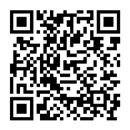

1 UC Irvine Homecoming
Join us in Aldrich Park for an all-day, family-friendly event featuring Ferris wheel rides, good eats, live music, the homecoming court coronation and a pregame rally before men’s basketball takes on rival Long Beach State.
11 Finding Light
Experience the profound journey of Alzheimer’s through music in a powerful event brought to life by 200 voices at the Irvine Barclay Theatre.
13 UC Irvine Grad Slam
UCI graduate students give their best three-minute pitch of thesis or dissertation research to compete for cash prizes and advance to the final UC-wide showdown.
22 Pharmacy Alumni Day
Connect with School of Pharmacy & Pharmaceutical Sciences peers, expand your professional network and gain insights from leaders in the field at the UC Irvine Susan & Henry Samueli College of Health Sciences Building.
3 LEAD Awards
The eighth annual Latino Excellence and Achievement Dinner at the UC Irvine Student Center honors those who champion Latino graduate student success and research excellence.
4 School of Nursing Reunion
Enjoy a guided tour and a hosted dinner while reminiscing and strengthening your professional connections through the Sue & Bill Gross School of Nursing.
22 UC Irvine Giving Day
This 24-hour, online fundraising campaign gives you and the entire UC Irvine community the chance to come together to support your favorite schools and programs.
29 UCI Baseball vs. Cal State Fullerton
Cheer on the Anteaters at Angel Stadium of Anaheim as they take on the Cal State Fullerton Titans.
1-3 Physical Graffiti
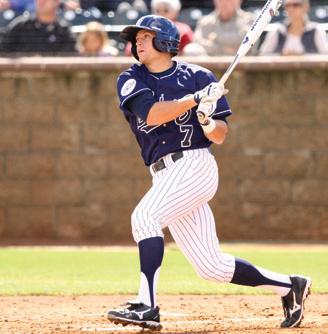
Blending contemporary ballet, high-energy hip hop and more, this annual dance concert at the Claire Trevor Theatre highlights the creativity of undergraduate choreographers.
2 ICS Alumni Hall of Fame
The Donald Bren School of Information & Computer Sciences invites you to come to the Beckman Center to nominate exceptional alumni who have made a significant impact in their profession or, in other ways, have brought distinction to the school.
15 Connect the Zots
Whether you’re looking to make new professional connections, volunteer or simply celebrate your UC Irvine roots, this is your opportunity to strengthen your bond with the Anteater family – right in your region.
29 ICS Project Expo
Join us for our fifth annual Donald Bren School of Information & Computer Sciences Project Expo at the UCI Student Center, where you’ll be able to explore 80+ capstone projects and connect with students, alumni and industry leaders.
31 California Kinship
Explore the private worlds of early 20th century Californians at UC Irvine Langson IMCA, featuring portraits and scenes of everyday life. Through Aug. 30.
12 Zot on the Yacht
Intercollegiate Athletics presents its inaugural signature fundraising event: a three-hour sunset cruise of Newport Harbor – a boatload of fun with Anteater student-athletes and coaches.
18 UCIAA Annual Meeting
Participate in the installation of the newest members of the board of directors, and discover extensive opportunities to deepen your engagement with the UC Irvine Alumni Association.

Events subject to change. For updates and additional information, scan the QR code or go to: https://engage.alumni.uci.edu/ magazine-events.
On view from Feb. 8 through May 17, 2025
Curated by graduate students from UC Irvine’s visual studies Ph.D. program, this exhibition explores the vibrant artistic communities of Los Angeles, Laguna Beach and La Jolla. It highlights how these locales shaped a unique aesthetic in response to Southern California’s dynamic landscape and cultural shifts in the early 20th century.
Open to all; admission is free.


INTERIM MUSEUM LOCATION:
FREE Art-Making for All Ages!
Visitors are warmly invited to join us during open gallery hours for hands-on art-making activities inspired by the artworks on display.
18881 Von Karman Avenue, Suite 100, Irvine, CA 92612
Airport Tower parking is free for two hours with validation.
Hours: Tuesday - Saturday, 10 a.m - 4 p.m.
For more information, scan QR code or visit imca.uci.edu

Eloy Ortiz Oakley ’96, MBA ’99, president and CEO of the College Futures Foundation and former chancellor of the California Community Colleges, answers the ZOT! Questionnaire, reflecting on being inspired by President Abraham Lincoln and undergraduate commencements.
Are you a lark or a night owl?
I am definitely a night owl.
What have you found most inspirational?
Every time I led commencement ceremonies at Long Beach City College and witnessed the pure joy that
What is your most influential read?
Team of Rivals: The Political Genius of Abraham Lincoln, by Doris Kearns Goodwin. Reading about the political challenges that Lincoln overcame by working with his former rivals is something that I have tried to put into practice throughout my career.

What is the last book you’ve read?
The Latino Century, by Mike Madrid
What is your favorite spot on the UC Irvine campus?
Housing along Adobe Circle Road, where my kids would play when I lived on campus with my family
What is your favorite UC Irvine memory?
Celebrating my undergraduate commencement with my young children that lived on campus. Being the first in my family to obtain a bachelor’s degree and sharing with my kids the experience of a college graduation ceremony is something I will never forget.
Who are your heroes?
Abraham Lincoln and my mom
What are your most treasured possessions?
Any of the items and pictures that remind me of my kids as young children
What is the best advice you’ve ever been given?
Don’t ever doubt yourself. You are exactly where you need to be.
What is the best advice you could give?
Trust your gut. If you feel strongly about an action that you are thinking about taking, then your gut is probably right.











This is what makes Giving Day extraordinary: the collective power of Anteaters to celebrate what matters most to them.



When Anteaters come together, we achieve what others only dream of. No day exemplifies this better than UC Irvine Giving Day. Each year, Anteaters rally around their passions: supporting ’Eater Nation, championing the arts, advancing health initiatives, or strengthening the schools that shaped them.


Join your fellow Anteaters on April 22. Learn more and make an early impact at givingday.uci.edu.


4/22/25

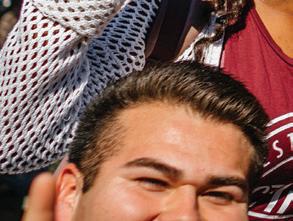

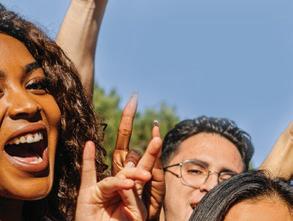













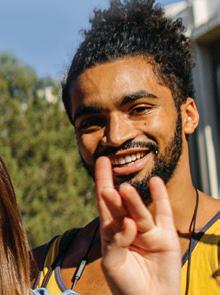

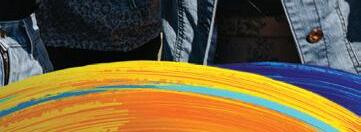

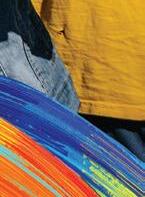

Experience compassionate, expert care delivered by Orange County’s only academic health system.
Our team of nationally regarded physicians, nurses, researchers and clinicians is ready to welcome you and your family.
Urgent care open 8 a.m. to 8 p.m., 7 days a week. No appointment needed. Visit ucihealth.org/wencenter to learn more or to make an appointment.